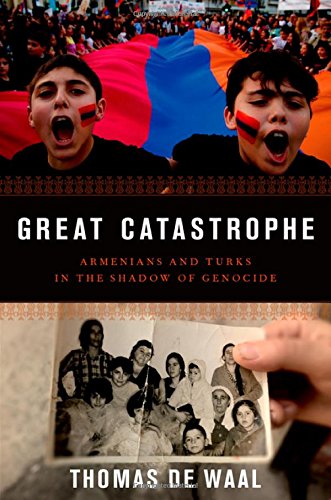The destruction of the Armenians of the Ottoman Empire in 1915-16 was the greatest atrocity of World War I. Around one million Armenians were killed, and the survivors were scattered across the world. Although it is now a century old, the issue of what most of the world calls the Armenian Genocide of 1915 is still a live and divisive issue that mobilizes Armenians across the world, shapes the identity and politics of modern Turkey, and has consumed the attention of U.S. politicians for years.
In Great Catastrophe, the eminent scholar and reporter Thomas de Waal looks at the aftermath and politics of the Armenian Genocide and tells the story of recent efforts by courageous Armenians, Kurds, and Turks to come to terms with the disaster as Turkey enters a new post-Kemalist era. The story of what happened to the Armenians in 1915-16 is well-known. Here we are told the "history of the history" and the lesser-known story of what happened to Armenians, Kurds, and Turks in the century that followed. De Waal relates how different generations tackled the issue of the "Great Catastrophe" from the 1920s until the failure of the Protocols signed by independent Armenia and Turkey in 2010. Quarrels between diaspora Armenians supporting and opposing the Soviet Union broke into violence and culminated with the murder of an archbishop in 1933. The devising of the word "genocide," the growth of modern identity politics, and the 50th anniversary of the massacres re-energized a new generation of Armenians. In Turkey the issue was initially forgotten, only to return to the political agenda in the context of the Cold War and an outbreak of Armenian terrorism. More recently, Turkey has started to confront its taboos. In an astonishing revival of oral history, the descendants of tens of thousands of "Islamized Armenians," who have been in the shadows since 1915, have begun to reemerge and reclaim their identities.
REVIEW:
This excellent scholarly look at the events surrounding the expulsion of the Armenian population from the Ottoman Empire during WWI makes for a timely and important read given the recent anniversary of the events. This complicated history is pulled apart to explain to a newcomer exactly how the Armenians came to be where they were and how they came to be the victims of such a tragedy. The descriptions of the killings themselves were presented tastefully and with a great deal of humanity. I was fascinated by the author's presentation of the more modern history of the Armenian diaspora and by the debates within in the community surrounding the issue of defining the killings as a genocide. Though I was familiar with the broad outlines of the issue, this book gave me a much deeper understanding of its impact on politics today. This book taught me a lot about a complex question and a politically vibrant diaspora. Highly recommended.

No comments:
Post a Comment